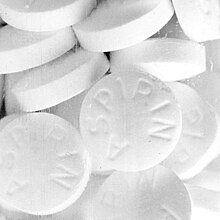
Back Dwelmmiddel Afrikaans Droge ALS መድኃኒት Amharic Sapaiyo AMI عقار (مادة كيميائية) Arabic Droga AST Bioloji aktiv maddə Azerbaijani داوا AZB Droga BCL Биологично активни вещества Bulgarian

A drug is any chemical substance other than a nutrient or an essential dietary ingredient, which, when administered to a living organism, produces a biological effect.[1] Consumption of drugs can be via inhalation, injection, smoking, ingestion, absorption via a patch on the skin, suppository, or dissolution under the tongue.
In pharmacology, a drug is a chemical substance, typically of known structure, which, when administered to a living organism, produces a biological effect.[2] A pharmaceutical drug, also called a medication or medicine, is a chemical substance used to treat, cure, prevent, or diagnose a disease or to promote well-being.[3] Traditionally drugs were obtained through extraction from medicinal plants, but more recently also by organic synthesis.[4] Pharmaceutical drugs may be used for a limited duration, or on a regular basis for chronic disorders.[3]
- ^ Ritter, James M.; MacEwan, David; Flower, Rod; Robinson, Emma; Henderson, Graeme; Fullerton, James; Loke, Yoon Kong (2024). "What is pharmacology?". Rang and Dale's pharmacology (Tenth ed.). London New York Oxford: Elsevier. ISBN 978-0323873956.
- ^ H.P., Rang; M.M, Dale; J.M., Ritter; R.J., Flower; G., Henderson (2011). "What is Pharmacology". Rang & Dale's pharmacology (7 ed.). Edinburgh: Churchill Livingstone. p. 1. ISBN 978-0-7020-3471-8.
a drug can be defined as a chemical substance of known structure, other than a nutrient of an essential dietary ingredient, which, when administered to a living organism, produces a biological effect
- ^ a b "Drug". Drug Definition & Meaning. The American Heritage Science Dictionary. Houghton Mifflin Company. Archived from the original on 14 September 2007. Retrieved 20 September 2007 – via dictionary.com.
- ^ Atanasov AG, Waltenberger B, Pferschy-Wenzig EM, Linder T, Wawrosch C, Uhrin P, Temml V, Wang L, Schwaiger S, Heiss EH, Rollinger JM, Schuster D, Breuss JM, Bochkov V, Mihovilovic MD, Kopp B, Bauer R, Dirsch VM, Stuppner H (December 2015). "Discovery and resupply of pharmacologically active plant-derived natural products: A review". Biotechnol Adv. 33 (8): 1582–614. doi:10.1016/j.biotechadv.2015.08.001. PMC 4748402. PMID 26281720.